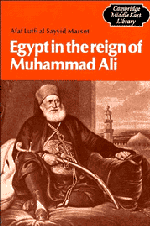Book contents
- Frontmatter
- Contents
- Dedication
- Preface
- Note on transliteration
- 1 Egypt under the mamluks
- 2 Muhammad Ali the man
- 3 A country without a master
- 4 Master in his own house
- 5 Family, friends and relations
- 6 Internal policies
- 7 Agricultural changes
- 8 Industry and commerce
- 9 Expansion to what end?
- 10 The undoing: Muhammad Ali and Palmerston
- 11 The aftermath
- 12 Conclusion
- Notes
- Glossary of Arabic and Turkish terms
- Select bibliography
- Index
10 - The undoing: Muhammad Ali and Palmerston
Published online by Cambridge University Press: 04 April 2011
- Frontmatter
- Contents
- Dedication
- Preface
- Note on transliteration
- 1 Egypt under the mamluks
- 2 Muhammad Ali the man
- 3 A country without a master
- 4 Master in his own house
- 5 Family, friends and relations
- 6 Internal policies
- 7 Agricultural changes
- 8 Industry and commerce
- 9 Expansion to what end?
- 10 The undoing: Muhammad Ali and Palmerston
- 11 The aftermath
- 12 Conclusion
- Notes
- Glossary of Arabic and Turkish terms
- Select bibliography
- Index
Summary
The occupation of Syria was to create problems for Egypt, both local and international. The Porte was not reconciled to the loss of important provinces such as those of Syria and the region of Caramania, the underbelly of Anatolia. Still less was the Ottoman government reconciled to its defeat at the hands of an underling, a nefarious example that others in the empire might seek to emulate. The Porte had not waged war against the derebeys of Anatolia and the mamluks of Iraq successfully, only to accept defeat at the hands of a wali. The peace of Kutahia to the Porte was a temporary suspension of hostilities until the next round could be fought, and until the Powers, or some of them at least, could be won over to the Turkish point of view. There was no treaty signed at Kutahia, no formal agreement, simply the appointment of Ibrahim as governor of the provinces he had conquered on a yearly tenure; a position that in theory could be revoked at any time. In practice, only force of arms could make him relinquish the territories.
As far as Muhammad Ali was concerned, that peace was also a temporary one, a hiatus until he could attain complete independence. Yearly tenure was a tenuous position at best, and a constant threat at worst, especially were he to die.
- Type
- Chapter
- Information
- Egypt in the Reign of Muhammad Ali , pp. 232 - 248Publisher: Cambridge University PressPrint publication year: 1984

